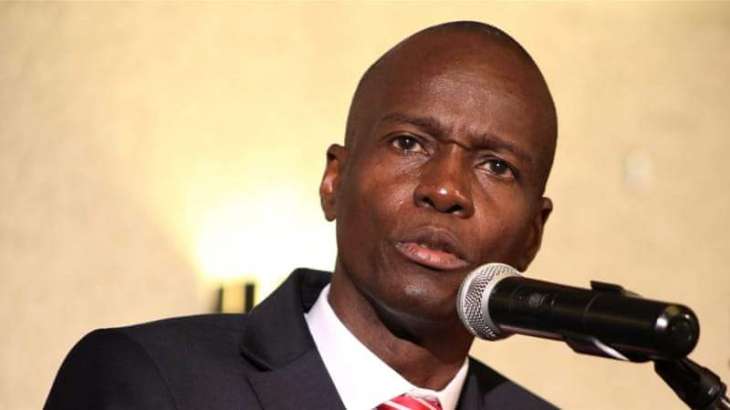The Haitian government has been cornered by an unfavorable economic and political situation inside the Caribbean country and the lack of outside support, which means there is a realistic chance it could be forced to resign in the near future, Brian Concannon, the founder and executive director of the Boston-based Institute for Justice and Democracy in Haiti (IJDH), told Sputnik in an interview on Tuesday
MOSCOW (Pakistan Point News / Sputnik - 26th February, 2019) The Haitian government has been cornered by an unfavorable economic and political situation inside the Caribbean country and the lack of outside support, which means there is a realistic chance it could be forced to resign in the near future, Brian Concannon, the founder and executive director of the Boston-based Institute for Justice and Democracy in Haiti (IJDH), told Sputnik in an interview on Tuesday.Since February 7, Haiti has been gripped by anti-government demonstrations, often marred by violent clashes between police officers and protesters, which led to several people being killed. Demonstrators have been calling on President Jovenel Moise to step down over corruption allegations and soaring inflation. Moise, on his part, has so far rejected the calls to resign, promising a range of economic relief measures.
GOVERNMENT LOSES POPULAR LEGITIMACY
According to Concannon, the Haitian government has not much popular legitimacy, and the medium term cause for this were the 2015-2016 elections, which were marked by violence and corruption, and in which the government was elected by a small percentage of the country's population as only about 20 percent of people came to vote.
"That left the government with formal legitimacy, but not much popular legitimacy. The way the government ended up governing was to support a patronage network, because it didn't have much popular support. It had a group of supporters and it continued to siphon money from the public treasury in order to give money to its supporters and that's what kept the government in power," Concannon noted.
As a result, this led to a number of economic problems, including high inflation, with the Haitian Currency having lost half of its value over the last five years, he stressed.
A short-term cause of the lack of legitimacy of the Haitian government, according to Concannon, is corruption, with the scandal around Venezuela's Petrocaribe aid program being a focus of attention.
"The focal point is around Petrocaribe scandal, which is a Venezuelan government project which provided Haiti inexpensive oil with good long repayment terms as a way of allowing Haiti to invest in infrastructure. Haitian government didn't invest in infrastructure, instead it stole the money mostly and Haiti now has to pay back the money that it doesn't have," the IJDH executive director pointed out.
HAITIAN PEOPLE CALL FOR MOISE'S RESIGNATION
Angered at economic and political problems, the Haitians are calling for Moise's resignation, and are saying they "will not quit until that happens," Concannon noted.
"The president doesn't have much support beyond his supporters ... The government really does have its back against the wall, it doesn't have much money, it doesn't have many friends abroad. I think there is a realistic chance it could be forced to resign soon," he said.
POLICE RESISTING GOVERNMENT CONTROL
Media reported earlier this month that the Haitian police had arrested seven foreign nationals including five US nationals carrying high-grade weaponry, who claimed they had been working for the Moise administration.
"The government has tried to do what it can to take control of the police, but the police have actually resisted it. The president tried to take powers to a point, do transfers, do promotions of the police, but the police have been fighting back against that. When protests started the president started going to the police stations, without the police hierarchy, handing out money and telling people to support him," Concannon underlined.
He suggested that the outcome of this conflict would "play an important role in whether the president survives."
INTERNATIONAL COMMUNITY HAS BEEN UNWILLING TO INTERFERE SO FAR
On February 14, the United States raised its Haiti travel warning to level 4, which is the highest one, citing "widespread, violent, and unpredictable demonstrations in Port-au-Prince and elsewhere in Haiti."
"Many see this as a sign of the US lack of support to the Moise regime. To a large extent president Moise is the international community's candidate ... I don't think that at this point the US is willing to engage militarily. I think the international community would prefer the president Moise stays in office. I don't see any willingness of anybody to step up and provide help to Moise in this situation," Concannon argued.
At the moment, the international community is interested in minimizing disruption in Haiti and managing the transition in a way that "helps their policies without requiring too much investment."
NEW ELECTION SHOULD BE POSTPONED
Under the Haitian constitution, in case of the president's resignation or impeachment, new election has to be organized within a period of 2-3 months. However, observers argue this would be hardly possible in Haiti and call for the creation of a supervising body, which would allow holding a good election.
"Most observers say that's impossible, that in Haiti situation you cannot organize good election in 3-4 months, which is the limitations. A lot of people are saying the we should extend that deadline, we should wait 2-3 years and have really good election, and a lot of civil society organizations are proposing a kind of oversight body, a national council that can oversee the government and provide more public input into it," the IJDH executive director stressed.
The IJDH, which was founded in 2004, and its Haiti-based partner, the Bureau des Avocats Internationaux (BAI), describe their mission as advancing "the Haitian people's struggle for justice and democracy" inside the Caribbean country and on the international stage.




